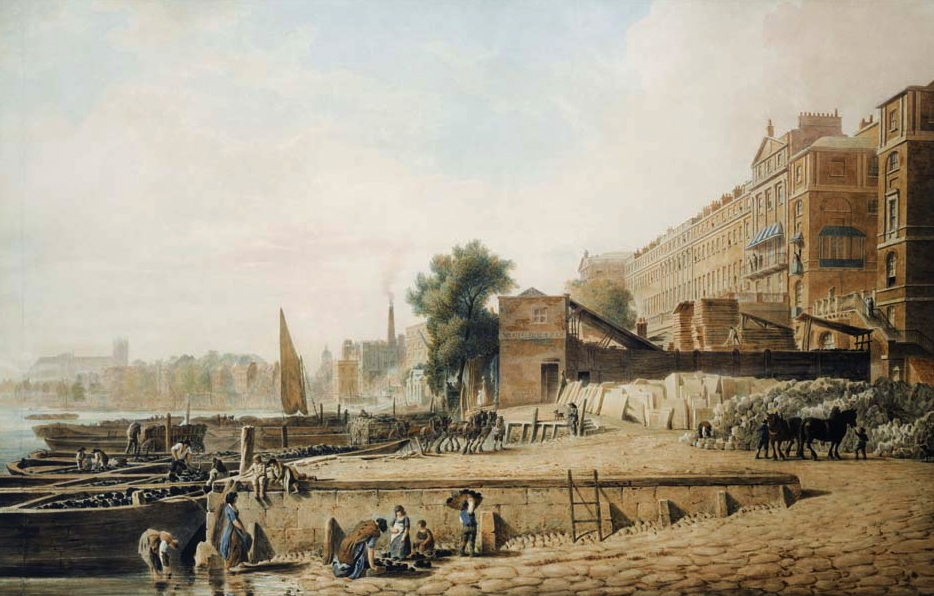
It is one thing to find a birth or marriage record of an ancestor, better yet a photo. To find an ancestor’s thoughts in a letter or diary is even more exciting, so I was thrilled when I discovered that my four-times great-grandfather had written several books. Finding digitized copies of those books online was like hearing a voice that had spoken 200 years ago.
Henry Smithers (1762-1828) made his living as a London coal merchant, and he wrote his first book, Affection; with Other Poems, in his spare time. For Henry, writing was a labour of love, and the theme of this book was affection. These were not the poems of the passionate young man who had married his sweetheart at age 20; rather, they were the words of a mature adult who loved his family, God, and England. The poems looked at affection from many viewpoints: the loyalty of a dog to its master, patriotism, the love of a mother for her children, the love between husband and wife. The second half of the book explored religious themes, notably “affection traced to its source, the benevolence of God,” and there are extensive notes at the back of the book.1
Affection; with Other Poems, by Henry Smithers of the Adelphi, London was published in 1807 when Henry’s success in business was also at its peak. The Adelphi refers to the terraced row of houses overlooking the Thames River in central London where he lived at the time. It was a unique building and no doubt an expensive address.
I do not know whether Henry made any money from his books, or whether he was well known as an author. A contemporary of famous poets such as William Wordsworth, he was far less talented. Affection was reviewed in several literary publications, where it received some negative comments, others positive. One scathing review was six pages long, which seems like a lot of space to devote to the work of an unknown author.2
Henry then turned to non-fiction. In his book In the Cultivation of the Arts and Sciences, he got in over his head without an editorial life preserver when he took on French philosopher Jean-Jacques Rousseau’s 1742 essay “Discourse on the Arts and Sciences.” Rousseau had argued that the arts and sciences had corrupted human morality because they stemmed from pride and vanity. Henry countered that “the cultivation of the Arts and Sciences are Favourable to virtue and to happiness.”3
Henry attributed the success of Rousseau’s essay to the author’s eloquence, and he admitted that “to contend with him, I am well aware, is to attack a giant in his stronghold, but truth is mighty and must prevail.” Unfortunately, while I tend to agree with my ancestor’s premise, his written arguments lacked focus.
That book was published in 1818 in Brussels, where Henry may have been living at the time. After the Napoleonic wars ended in 1815, he travelled to Europe and wrote a series of letters to his family in England in which he described his observations about the Netherlands, Bruges, and other places on the continent. Those letters formed the basis of his next book.4
His last major project was even more ambitious. He appears to have relocated to Liverpool, where his son John Hampden Smithers lived. Henry took the city as his subject, and his 460-page Liverpool, Its Commerce, Statistics, and Institutions: With a History of the Cotton Trade covered the city’s early history, its churches, the linen and cotton industries, the slave trade, the whaling industry, agriculture in the region and a description of the city’s philanthropic societies.5
With these last two books, Henry finally seems to have hit his stride as a writer. I suspect that, if Henry Smithers had been born in the 20th century rather than the 18th, he might have studied history or literature at university, then gone on to be a teacher or a journalist. He might even have been a blogger.
photo credit: Museum of London
Notes
- Smithers, Henry. “Affection; with Other Poems, by Henry Smithers of the Adelphi, London:London: Printed for the Author by T. Bensley and Sold by W. Miller, 1807. https://books.google.ca/books?id=DGUUAAAAQAAJ&dq
- The Eclectic Review. Vol. 3, 1807. p. 904-908. https://books.google.ca/books?id=3LA2AQAAMAAJ&dq. The following reviewer was more complimentary: Matthews and Leigh. The Cabinet: or Monthly Report on Polite Literature, Volume 2. p. 42. https://books.google.ca/books?id=-w0TAAAAYAAJ&dq
- Smithers, Henry; Rousseau, Jean-Jacques. In the Cultivation of the Arts and Sciences to which is added a translation of the celebrated prize essay of Jean-Jacques Rousseau, wherein he advances an opposite sentiment. Brussels: Printed at the British Press, 1818. https://books.google.ca/books?id=2FMTAAAAQAAJ
- Smithers, Henry. Observations made during a tour in 1816 and 1817, through that part of the Netherlands, which comprises Ostend, Bruges [&c.]. To which is added, several original anecdotes relative to the battle of Waterloo. In a series of letters. Brussels. https://books.google.ca/books?id=5mYBAAAAQAAJ&source=gbs_navlinks_s. This book appears in several editions with slightly different names, but I don’t think the content differs much
- Smithers, Henry. Liverpool, Its Commerce, Statistics, and Institutions: With a History of the Cotton Trade.
Liverpool: T. Kaye, 1825. https://books.google.com/books?id=jdc-AAAAYAAJ
To learn more about The Adelphi, see http://www.britainexpress.com/London/Adelphi.htm.
This is the last in a series of articles about the Smithers family of London, at least for now. I will write another article about Henry Keene Smithers’ wife’s roots on the sugar plantations of Antigua and one about the Papps family of Salisbury. I have already done several stories about Henry’s great-granddaughter Clara Smithers, including her childhood in Brooklyn and marriage in Montreal. Eventually, I’ll get back to her father, banker Charles Francis Smithers.

